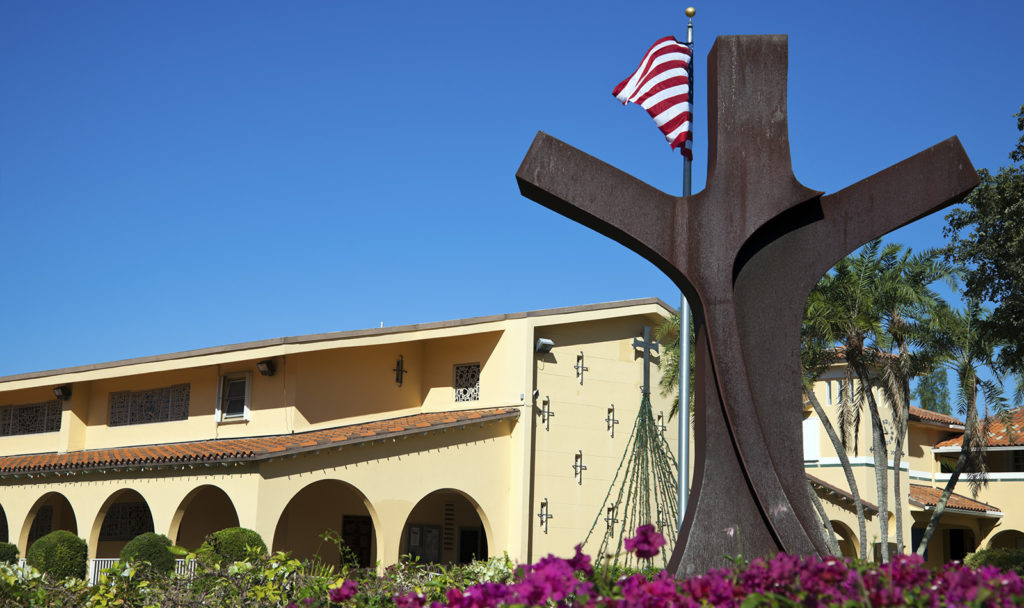Churches Fear Special Assessment Could Put them “Out of Business”
Tony WintonFebruary 25, 2019

Catholic church – Key Biscayne, Florida by Henryk Sadura via Adobe Stock
Key Biscayne’s religious leaders say one feature of a proposed utility undergrounding plan could cause such a financial strain on their institutions that it might put them out of business. That’s because officials say that under a possible “assessment” concept, houses of worship would no longer be exempt from capital project costs, as they have been for previous Key Biscayne projects.
According to figures provided by the Village Public Works Department, houses of worship would be on the hook for the following amounts:
- St. Agnes Roman Catholic Church would pay $403,915
- Crossbridge Church, $185,725
- Key Biscayne Community Church; $90,597
- St. Christopher’s Episcopal Church, $85,690
- Chabad of Key Biscayne, $18,852
One local pastor was stunned he hadn’t been consulted about the assessment plan, which is nearing a decision deadline if the village wants to go forward with utility undergrounding.
“This is the first I’m hearing of it,” said Community Church Pastor Denny Eastling when told of the estimate. The village “may be putting churches out of business by forcing this cost on them,” he said, adding that his church may have to consult its legal counsel. At the Chabad of Key Biscayne, Rabbi Yoel Caroline also said he was not aware of the assessment methodology and its potential impact on his organization.
“It would be a significant strain,” Caroline said.
St. Agnes Roman Catholic Church referred questions to the Miami Archdiocese, which did not return calls for comment. St. Christopher’s By-the-Sea and Crossbridge Church also did not return requests for comment prior to publication deadline.
The assessment plan’s supporters say it’s more uniform and therefore fairer than regular property taxes. Designed by Raftelis Financial Consultants, Inc., it would establish a complex system of “Economic Benefit Units,” or EBU’s, that would be assigned to each property on the basis of benefit. There would be reliability, safety, and aesthetic benefits. Raftelis consultant Habib Isaac told panel members there is no way to exempt houses of worship or governmental entities under an assessment methodology.
In the Town of Palm Beach, which used a similar EBU plan also designed by the Raftelis firm, churches no longer had the benefit of a property tax exemption.
“They all paid,” said Tom Bradford, the former Palm Beach town manager who led the undergrounding project there. Only the school district escaped assessment, Bradford said, because of state law.
The bright side, for both churches and other owners, is that assessments can be prepaid, avoiding interest and other costs. For example, were St. Agnes church to pay the projected annual assessment of $28,322, its projected 30-year cost would be $849,670. A prepayment would avoid $455,855 in interest cost.
The property tax exemption for houses of worship is fairly narrow under Florida law, and can be subject to challenge. In December, the Miami Herald reported the Miami-Dade Property Appraiser hit First Presbyterian Church of Miami with a $7 million tax bill, claiming the church had leased a portion of its grounds to a for-profit school and food trucks, a decision the church is fighting. Florida statute 196.196 allows exemptions only for “charitable, religious, scientific, or literary” purposes.
In Key Biscayne, the exemption does not apply to two well-known private clubs, the beach and yacht clubs. The county tax collector’s web site shows the Beach Club paid property taxes of $37,687 and the Yacht Club paid $76,348.



Responses
Karen Llorente
Feb 26
Brilliant!!!!
The comments are closed.